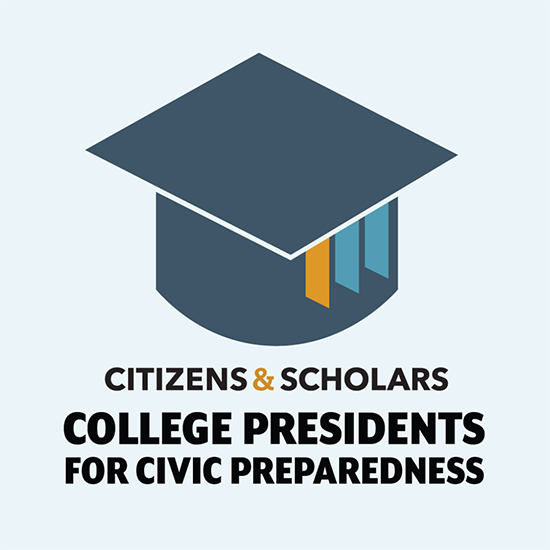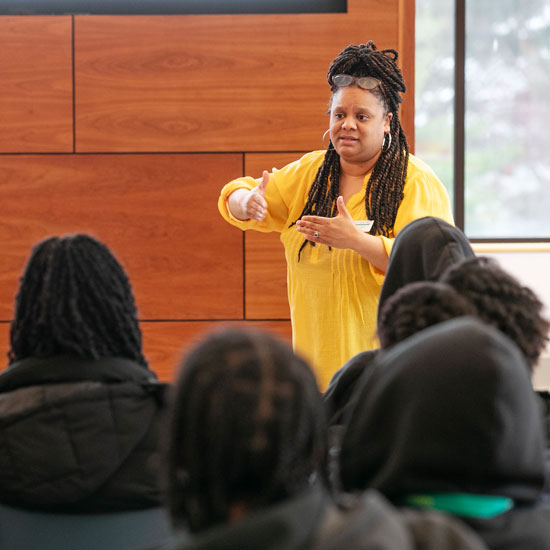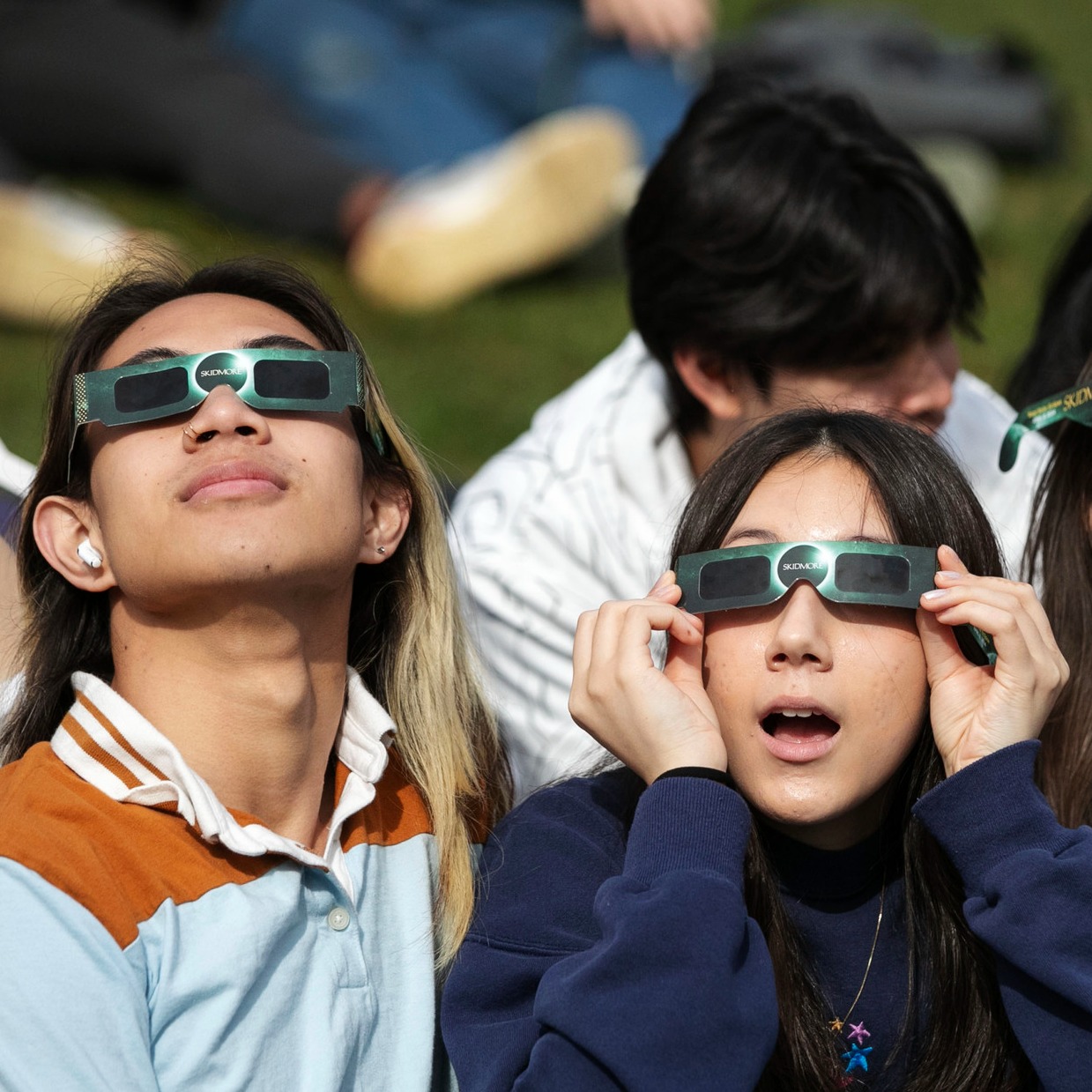Calling all story tellers
Sarah Friedland, director of the Storytellers’ Institute, joined Skidmore’s recurring “Facebook Live Friday” interview series to discuss the fourth annual workshop and forum for documentarians at the College and beyond. This year’s theme? “Surveil and surveilled.”
To learn more about this year's Storytellers' Institute visit the program website here. For other John B. Moore Documentary Studies Collaborative (MDOCS) programs and events view the schedule here.
Facebook Live: Sarah Friedland
Interview transcript:
SKIDMORE: This is part two in our focus on the MDCOS program here at Skidmore. Tell us a little bit about the program, how it relates to MDOCS and to Skidmore.
FRIEDLAND: The Storytellers' Institute is part of MDOCS and we also work in collaboration with MDOCS. It's a five week summer institute/residency that's a shared space between Skidmore students, faculty and visiting documentary makers. The idea of the Storytellers' Institute is that all these people will come to the Skidmore Campus, and share in this really amazing creative and intellectual space together that always revolves around a yearly theme.
It's also integrated into Skidmore, in that the students who are part of the Storytellers' Institute have to take a preparation class. That kind of prepares them in knowledge about the theme, and also just gets them a little bit further on the projects that they'll be working on during the Storytellers' Institute.
SKIDMORE: You mentioned theme. This year's theme is “Surveil and Surveilled.” Can you talk a little bit about it and why this particular theme this time around?
FRIEDLAND: As I said, this is our fourth year. I'm just going to tell you a little bit about
the themes that have happened in past institutes.
The first year, the theme was “Family.” People were coming with projects that were
connected to the idea of family, both chosen and also the family that you're born
and raised into.
Then, the second year, it was “Walking the Line Between Fact and Fiction.” The idea
was thinking about documentary and the way that it challenges the idea of truth, and
is challenged by truth.
Then, last year, our theme was “Space and Place.” So, looking at documentary practices that are very rooted in place in different ways, but then also looking at how documentary itself has been responsible for creating place and also for being. Documentary was also kind of rooted in ideas in some ways of colonialism. There's a lot of talk about decolonizing the field of documentary right now, so how does that connect to space and place.
This year, our theme, as you said, is “Surveil and Surveilled.” I'm really interested
in themes that do two things. One, they speak to larger social, cultural, political
prescient issues. Surveillance is something very much that is affecting everybody's
life, and everybody is also engaging in willingly. Everything from state surveillance
of low income or people of color neighborhoods to the ways that we also engage in
surveilling ourselves on social media, surveillance by corporations, etc.
Also, thinking about the practices that documentary and surveillance share, so thinking
of themes that explore this meta relationship. Documentary and surveillance are both
based around the idea of recording and observing. What does that say about our practice
as documentarians, but also how can documentarians use this incredible archive that's
being amassed by all of these forms of surveillance, good and bad, to challenge surveillance
and to make truth of surveillance.
I want to say, we're also really thinking about how can surveillance produce good
in the world? One of the things that I've been thinking about is, for example, forensic
architecture is this emerging field that uses a lot of CCTV footage to reconstruct
human rights abuses. Then, use that footage and those computer generated animations
that they create from that to take people to trial and convict the abusers. It's not
always a horrible thing.
SKIDMORE: That’s very interesting. What are some of the sessions then that will be an outgrowth of that theme at this year's upcoming event? It's this summer, correct, in June?
FRIEDLAND: Right. The Storytellers' Institute is five weeks from the end of May until the end of June. Then, in the second weekend of June, we have an event series that revolves around the theme. We're still locking down the full schedule, but we have our keynotes locked down. One of the keynotes that was really exciting, she is a woman named Assia Boundaoui and she's coming with her whole filmmaking team.
She's currently making a project called the “Feeling of Being Watched,” which looks at surveillance of Muslim Americans outside of Chicago, and the incredible civil rights abuses that are happening in her home neighborhood where she grew up. We had contacted her about being one of our keynote speakers for this weekend long series. She reached back to us and said, "Actually I would really like to be one of the storyteller visiting fellows." So, she's both going to be a keynote and with us for the whole five weeks.
Then, the other person who is a keynote for the weekend is Hasan Elahi who has come to Skidmore before. There was a recent show that looked at issues of surveillance and his work was part of that show. He works in image based installation and is really thinking about questions of surveillance and citizenship and migration and where people belong and are not able to belong.
SKIDMORE: You talked about a filmmaking crew being one of the main sessions, and then this idea of image based installation. It speaks to a concept that documentary has perceived by most to be a filmmaking-only concept. How are you working within Storytellers' to either debunk that or expand that thought?
FRIEDLAND: Within MDOCS and Storytellers' certainly is this real push to make sure that people think about documentary in an interdisciplinary way. Documentary is kind of ruled by film. People always think film first when they think documentary. We think much more expansively: photography, audio, installation, performance, anything that's using non-fiction to create, to interrogate, to question.
The Storytellers' Institute, when we're looking for our visiting fellows, we're interested in making sure that we're not only inviting filmmakers, we're not only reaching out to filmmakers in the call — we're really trying to attract multiple disciplines. This year, we have some amazing people joining us. We have a still photographer, a person who works in radio, a person who is doing 360 immersive work and a filmmaker and another filmmaker is also doing an internet archive kind of project.
I think I'm forgetting somebody actually. Oh yeah, we have an experimental documentary animator as well.
We also encourage that in our students. The student fellows this year are also working in a variety of different mediums from audio to film to internet based interactive work. That's really important to us.
SKIDMORE: Now, what about the participants who we're inviting to this five-week program? Who should come to Storytellers’ Institute and who does come?
FRIEDLAND: Right. The five weeks is just for the students who go through an application project.
The faculty go through an application project, and visiting fellows go through an
application project. That becomes a community in and of itself.
For the weekend event, the second weekend in June — which is June 7th through 10th — all the events that we will have that weekend are free and open to the public.
We do a lot of outreach, both inside the Saratoga and Capital District, but also to
the greater documentary community in the US and beyond. We're going to have, I think,
some people coming from Europe this year as well. Also, this theme engages a different
audience. We hope that academics will come join us and also activists.
SKIDMORE: So, you're a filmmaker yourself. You joined Skidmore last year for Storytellers' Institute. What has your career been like to this point that's brought you to come lead the Storytellers' Institute?
FRIEDLAND: I'm primarily a single screen documentary maker, but I also do media artwork. I've worked in installation and also interactive online work. I've made multiple feature projects. I also, just before joining the Storytellers' Institute, I was director of the Film and Media Program at Wagner College on Staten Island. I have a real hybrid practice of both making and educating. What really attracted me to the Storytellers' Institute was that I would get to be able to really keep a foot in both of those worlds. I think it's a really innovative, exciting space for pedagogy.
The fact that we get to bring students, faculty and visiting fellows together to all think and make, to me, that was just like, "Whoa." That spoke to all the different sides of me. I feel like I've also been a resident in multiple residencies and institutes. Those experience gave me an idea of what I sought in this space, and how I hoped it would grow.
SKIDMORE: Great. We're lucky to have you here to help us keep evolving the program. You spoke about innovating and being part of innovation here at Skidmore. What themes and trends are you seeing that are either innovative or evolving the documentary storytelling field from your perspective?
FRIEDLAND: I think that MDOCS is really right on, in terms of ‘interdisciplinarity.’ I think that documentary has always been interdisciplinary, but it's really beginning to see itself and others are beginning to see it more and more in that way. There's more of a push for single screen filmmakers to explore different mediums. I feel like we're really in sync with that. I also think one of the big areas that documentary is questioning right now is the voice and who gets to tell what story.
I think that with the Storytellers' Institute and MDOCS we think a lot about ethics and we think a lot about these ideas of voice. It's something that we teach and something that we consider when we're deciding the people and the projects that we invite. That's something that, I think, we're resonating with the whole ... it's not just documentary that's talking about that. I think it's also across campuses and the country.
Then, I think the other place where, especially in this country, documentary is beginning to grow and expand is this question of form, and seeing documentary as a place for creative innovation as well as a place where we have to and must feel compelled to tell important stories. It's not just the things that we're talking about in our projects, but it's also the way that we're talking about them and the choices we're making in terms of form. I think that's a huge conversation in documentary.
That's something that in MDOCS a lot of the classes are moving towards pushing and talking about that [form]. Cecilia Aldarondo has an amazing course this summer, or this spring, that's all about form. Again, it's not about saying, "Oh content isn't important." It's about, "These are both important things, and that when we truly make something interesting, it's because we're taking both of those things [form and content] into consideration."
SKIDMORE: Sounds like an important conversation and important work. We'll be looking forward to the full schedule for Storytellers’ as it comes together for the summer. Sarah, thank you for joining us.
FRIEDLAND: Thank you for having me.
SKIDMORE: We're looking forward to a great year for you.
FRIEDLAND: Great!


